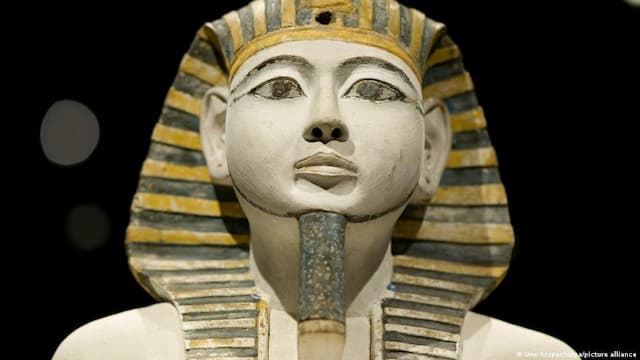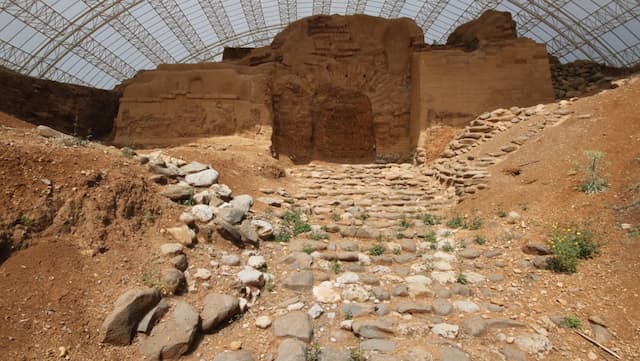Three decrees that gave Christ authority (Psalm 110)

Psalm 110 proclaims three edicts from heaven that reconfigure authority on earth. Jesus quoted the first, and that was enough to silence his opponents (Matthew 22:41-46). The second would have put them in an unenviable position. And the third would have been too frightening to face.
Jesus quoted the Psalm in the context the king/temple confrontation (Matthew 21–28). In the days of the kingdom, the two roles that were “christed” (anointed) by heaven had been in conflict. After the exile, the high priest was given the crown (Zechariah 6:11-14) until the kingship would return (Zechariah 9:9). A hundred years before Christ, priests from the Hasmonean family were making kingship claims, claims asserted with much bloodshed.
But the three decrees of Psalm 110 change the authority structure on earth: a) restoring the kingship, b) resolving the enemies, c) reconfiguring the priesthood.
Psalm 110:1-4 (NIV)
Of David. A psalm.
1 The Lord says to my lord:
“Sit at my right hand until I make your enemies a footstool for your feet.”
2 The Lord will extend your mighty scepter from Zion, saying,
“Rule in the midst of your enemies!”
3 Your troops will be willing on your day of battle. Arrayed in holy splendor, your young men will come to you like dew from the morning’s womb.
4 The Lord has sworn and will not change his mind:
“You are a priest forever, in the order of Melchizedek.”
Let’s look at each decree in turn.
“Sit at my right hand …” (110:1)
This decree resolves the demise of the Davidic kingship (Psalm 89:20-49), by giving the authority of the divine throne to David’s lord. If God gave the kingship to someone whom David calls my lord, then someone greater than Solomon is here, and the temple needs to consider its relationship with the king.
This has been Jesus’ consistent message, calling them to turn to him, for heaven’s reign is now close to being restored (Matthew 4:17). It’s the essential meaning of Christ: the one anointed to reign on earth with heaven’s authority, siting at the right hand of the All-powerful One (Matthew 26:64).
“Rule in the midst of your enemies …” (110:2)
This decree is the corollary of the first. It resolves the apocalyptic problem. For six centuries before Christ, God’s people had been dominated by foreign rule, held captive to their enemies.
But Jesus sees that the enemies of God’s reign were not just foreign kings and emperors. The temple leaders wanted to kill God’s anointed (Matthew 16:21; 17:23; 23:31-37). The Psalm spoke of willing troops, but Jesus was not assembling troops against them. He refused to call on troops, earthly or heavenly (26:52-53).
Jesus believed the temple would fall because of God’s decree, without him needing to bring it down (Matthew 23:38; 24:2). He expected divine authority to come to him in the midst of his enemies — while he and his followers are taking up their crosses. The resurrection from the dead would be the divine decree that raised him up and gave him the kingship (16:21-28).
That’s why Jesus did not follow the violent tone of Psalm 110:5-7. His understanding of divine authority was even greater than revealed in the Psalm. Jesus was convinced the era of his reign would reach fulfilment as he reigned in the midst of his enemies, with his followers training the nations to obey everything he commands (Matthew 28:18-20).
“You are a priest forever …” (110:4)
This decree resolves the temple/kingship conflict. The power shift never occurred in the Old Testament kingdom. But it makes sense as heaven’s response to the temple handing over the king of the Jews to be crucified by the nations.
Anyone familiar with the OT knows that the high priest must be a descendant of Aaron (from the tribe of Levi), whereas a king must be a descendant of David (from the tribe of Judah). One person could not have both roles, despite the temporary arrangements in Zechariah and the kingship claims of the Hasmonean family. Aaron’s grandson had been promised an enduring priesthood across the generations (Psalm 106:30-31), just as David’s family had been promised the kingship forever (2 Samuel 7:16).
Despite this, Psalm 110 declared that God would give the kingship to David’s lord when he restored the kingdom. It even found a precedent. Even before there was a Levitical priesthood, there was someone who was called king and priest (Genesis 14:18).
The temple that refused its king would be stripped of authority. That’s why Jesus told them the temple was going down, causing great suffering for the city (Matthew 24).
If heaven gave both roles to the king, he alone could save his people. The city that refused his leadership could only be redeemed by recognizing the one who comes in the name of the Lord (Matthew 23:39).
Conclusion
Jesus the anointed son of David is not only the branch of David’s felled dynasty, but the very root of David’s kingship. He is human descendant restoring the reign of the Sovereign Lord to all the earth.
We reign with Christ, not with some kind of triumphalism over our enemies but in the midst of his enemies. Servants of the king have authority to take up our crosses with him, bearing away the sin of the world against divine authority as we show the nations how to live under his authority.
We function as a kingdom of priests under the leadership of the priest-king who mediates the divine presence to the world through his throne (Hebrews 4:16). In Christ, we are the image (visible representation) of the God who cannot be known any other way, the temple where the reunified world experiences its God in the body of Christ, the corporate servants of the God who lives among us.
That’s the reconfigured world according to God’s decree. We joyfully anticipate the fully renewed heaven and earth, restored in the Alpha and Omega, the one who was our leader in the beginning and will be in the end. He is the ruler and saviour of God’s reconfigured world.
What others are saying
James Luther Mays, Psalms, Interpretation (Louisville, KY: John Knox Press, 1994), 350–354:
In using the Apostles’ Creed to declare its faith, the church says over and over again, “I believe in Jesus Christ … who sits at the right hand of God.” … The place of this phrase in the confessions is based on the repeated citation of Psalm 110:1 in the New Testament (Matt. 22:44; Mark 14:62; 16:19; Luke 22:69; Acts 2:34–35; 7:55; Rom. 8:34; Eph. 1:20; Col. 3:1; Heb. 1:3, 13; 8:1; 10:12; I Peter 3:22). These citations together with other references and quotations make it the psalm most used in the New Testament. …
The psalm, then, is a prophetic text for an event—the incorporation of a person into a primary role in the order of God’s way with the world. The event took place in the sacred proceedings of enthronement; the oracle gave the event the reality of God’s authorization and purpose. …
Jesus uses verse 1 in a way that assumes that he and his contemporaries understand that the oracles in Psalm 110 concern the Messiah. The references to Jesus’ session at the right hand of God (listed above in the introductory paragraph) use the psalmic phrase, “Sit at my right hand,” as a kind of code to speak about the outcome of the career of Jesus. The phrase draws on the cosmic and eschatological understanding of the psalm to define the christological “now.” While Jesus’ words and deeds, his life and death and resurrection, belong to the past, his session belongs to the present. It is this present “location” of Jesus that holds his past in relation to the believer’s ongoing life. … The priest on whom believers depend is the Messiah at the right hand of God.
Related posts
- David’s Lord (Mt 22:41-46)
- The two powers (Mt 21–28)
- Who was Melchizedek? (Gen 14)
- Jesus in the Psalms? (Psa 8)
- How to read Psalms (Psa 3)
Seeking to understand Jesus in the terms he chose to describe himself: son of man (his identity), and kingdom of God (his mission). Riverview Church, Perth, Western Australia
View all posts by Allen Browne











